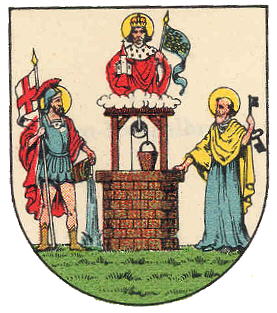Wien-Hungelbrunn: Difference between revisions
Knorrepoes (talk | contribs) m (Text replace - "Österreich" />" />" to "Österreich" />") |
Knorrepoes (talk | contribs) m (Text replace - "[[Literature" to "{{media}} [[Literature") |
||
| Line 17: | Line 17: | ||
The region is now part of the 4th municipal district, Wieden. | The region is now part of the 4th municipal district, Wieden. | ||
{{media}} | |||
[[Literature]] : Ströhl, 1902; [[Kaffee Hag : Die Wappen der Republik Oesterreich|Coffee Hag album]], 1930s; [http://www.wien.gv.at/bezirke/bezirkswappen/ http://www.wien.gv.at/bezirke/bezirkswappen/] | [[Literature]] : Ströhl, 1902; [[Kaffee Hag : Die Wappen der Republik Oesterreich|Coffee Hag album]], 1930s; [http://www.wien.gv.at/bezirke/bezirkswappen/ http://www.wien.gv.at/bezirke/bezirkswappen/] | ||
Revision as of 09:01, 9 July 2014
| Heraldry of the World Civic heraldry of Austria - Österreichische Gemeindewappen |
WIEN-HUNGELBRUNN
State : Wien (Vienna)
Origin/meaning
The name is a dialect version of a mythical "Hungerbrunn", a "well of famine", denoting a well or fountain, which only carried water in years of famine. This is (or rather, was) a widespread popular belief in Austria. Similar wells, springs or even creeks can be found in many parts of Austria.
The arms show the well, surrounded by the saints Leopold (for Niederösterreich), Florian (as protector against fire and patron saint of St Florian's church in Matzleinsdorf) and Peter.
The region is now part of the 4th municipal district, Wieden.
Contact and Support
Partners:
Your logo here ?
Contact us
© since 1995, Heraldry of the World, Ralf Hartemink 
Index of the site
Literature : Ströhl, 1902; Coffee Hag album, 1930s; http://www.wien.gv.at/bezirke/bezirkswappen/











